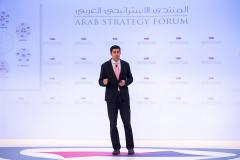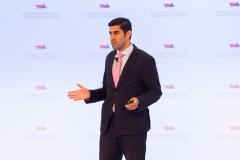ASF 2018: Dubai Should Embrace Its Role As Anchor For West Asia, Says Parag Khanna
“Dubai has emerged as the newest member among the most significant global cities, a stable city that the world can rely on, and it should embrace its role as the anchor of West Asia,” said leading geopolitical expert Parag Khanna, at the concluding session of Arab Strategy Forum (ASF) 2018, remarking on the continued efforts made by the emirate.
Khanna compared the geopolitics of the 21st century to a tug or war, with ongoing conflicts over trade and economic control rather than raging territorial wars. He attributed the complexities brought about by current global connectivity among even antagonistic nations, to the fact that despite all tensions and predictions to the contrary, no World War III has broken out as yet, and added that he is optimistic about the future.
“It is time we rethink the cartography of geopolitics, away from the old colonial manner. Every nation matters, and freely making connections with every part of the world can result in a rise in the volume of trade,” Khanna said. “There is no single power at the centre dictating terms, but that does not mean that the world will fall into chaos. Regionalism and reciprocity are the way forward.”
“Regional stability is critical to building confidence around the world,” Khanna remarked, quoting the post World War formation of the European Union as an example. Countries within a region, he advised, should think about the services they can offer each other, such as water and oil, which would be mutually beneficial, besides strengthening the region as a whole.
According to Khanna, there is more power parity now, in a world that is economically tripolar. New complementarities and equilibria have evolved as a result of this redistribution of power. The focus should now be on Asia as it is responsible for over 40 per cent of the global GDP. All of Asia is more significant than China alone, as economic powers have gravitated towards each other. The Belt and Road initiative should be embraced as it connects East Asia to the West, and the Middle East should consider moving away from post-colonial borders and define itself as West Asia.
“Trading relations across Eurasia – Europe and Asia – are more significant in the current scenario than Transatlantic trade relations”
“One of the failures of the post-colonial era is that not enough investment has been made into infrastructure,” said Khanna. “Now that China’s Belt and Road Initiative has got under way, other countries are also making infrastructure investments.” He urged the Gulf countries to evolve to accept this trade route and benefit from it. ‘Asianisation of Asia’, as he termed it, has enormous implications for the GCC region and the Arab world in general.
“It is time to form an ‘Arab-Asian Nexus’ and embrace the inevitable economic Asian World,” Parag Khanna added.










